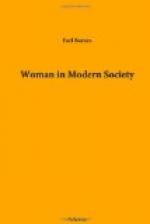In the further discussion of this subject it will then be taken for granted that in education, feminization means emphasis on languages, literature and history, as opposed to mathematics, physics, chemistry and civics. For the elementary schools we have no data capable of reduction to figures, but general observation, backed by an examination of courses of study and textbooks, will compel any one to say that in twenty years we have made wonderful progress in reading, language, stories, mythology, biography and history; while all our efforts to bring nature work into vital relation with the schools have borne little fruit. Our country schools need lessons in agriculture, and the children should gain a deep sense of country life. But how can celibate young women, longing toward the towns, give this? Any subjects well taught are sure to be increasingly taught, and it takes no extended study to see that our elementary schools are being feminized in the direction of literature. This is the more striking when we remember that these twenty years have been dominated, in the larger world, by scientific interests.
In the high schools and seminaries, we have fairly complete returns showing the number of students enrolled in certain subjects since 1890. The pupils taking Latin have increased 15%; French, 4%; German, 13%; English literature has increased in ten years 7% (there is no record for this subject before 1898); and European history, 27%. There has also been an increase of 11% in algebra and 10% in geometry, probably partly due to vocational need and to the emphasis laid on these subjects for admission to college. But physics, in the twenty years under consideration, has fallen off 7%; chemistry, 3%; physical geography, 5%; physiology, 15%; and civics, 7%.[30] A careful study of these figures must convince any fair-minded person that our school curriculum, even in the secondary field, where women’s control is least complete, is moving rapidly in the direction of what we have called feminization.
[30] Report of the United States Commissioner of Education, 1910, Vol. II, p. 1139.
The schools, too, must increasingly do something more than train the intellect; and in all physical activity involuntary suggestion is very powerful. Playgrounds are laboratories of conduct, and they should not only give physical exercise, but should also furnish standards and ideals. There can be no doubt that women are physically more restrained, retiring, non-contesting, and graceful than men; but can dancing, marching, and gymnastics take the place of more aggressive, direct and violent contests in the training of boys? So in industries, women are more given to conserving, arranging and beautifying, more given to clerking and recording, while men are more creative, disbursing, more given to mining, agriculture and commerce. Even granting equal understanding and experience, the tradition of the race must count for much; and




